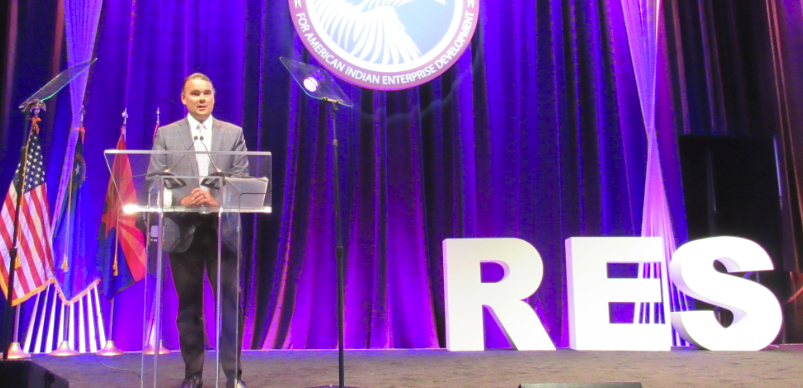
- Details
- By Levi Rickert
WASHINGTON — The U.S. Senate voted on Saturday to confirm Bryan Newland as Assistant Secretary-Indian Affairs at the Department of the Interior.
Newland was nominated by President Joe Biden in April to serve as the highest-ranking Senate-confirmed official in Indian Affairs at the U.S. Department of the Interior. Prior to his nomination, Newland was tapped by President Biden in February to serve as Principal Deputy Assistant to the Secretary of Indian Affairs at the U.S. Dept. of the Interior.
Want more Native News? Get the free daily newsletter today.
Newland now has the solemn responsibility of maintaining the United States’ government-to-government relationship with the 574 sovereign tribal nations.
He will be the first assistant secretary of the Interior-Indian Affairs to serve under the first American Indian to serve as Secretary of the Interior, Deb Haaland (Laguna Pueblo).
In his role, Newland will oversee the Federal Indian Boarding School Initiative that was established by Sec. Haaland in June.
“We must shed light on what happened at federal Boarding Schools,” Newland told Mvskoke Media this past week. “As we move forward in this work, we will engage in Tribal consultation on how best to use this information, protect burial sites, and respect families and communities.”
Newland is the former president of the Bay Mills Indian Community, based in Michigan’s Upper Peninsula.
More than 40 tribes and tribal organizations supported Newland’s nomination.
Donate today to help us uplift Native Voices, Native Perspectives, and Native News.
After Saturday’s Senate confirmation, Senate Committee on Indian Affairs Chairman Bryan Schatz (D-HI) said Newland has invaluable experience as a tribal leader, personal and in-depth knowledge of the issues facing tribes, expertise in complex areas of federal Indian law, an understanding of Interior’s unique role in fulfilling and enforcing the federal trust responsibility to Native peoples.
“It is clear from the record that Mr. Newland has the qualifications to succeed in this role, and to serve this country with honor as one of the chief federal advocates for American Indians, Native Hawaiians, and Alaska Natives,” Schatz said.
Natonal Congress of American Indians (NCAI) Fawn Sharp released the following statement after Newland's confirmation:
“The confirmation of Bryan Newland as the Assistant Secretary-Indian Affairs is an important step forward in strengthening the nation-to-nation relationship between the United States and Tribal Nations, and we congratulate the Assistant Secretary on this achievement. We are in a time of great opportunity to make inroads on critical issues such as growing tribal economies, developing infrastructure, building healthy communities, and protecting sovereignty. This confirmation places someone with the experience and a unique understanding of these issues into this key role and NCAI looks forward to working closely with Assistant Secretary Newland on advancing Indian Country’s priorities.”
Bay Mills Indian Community President Whitney Gravelle expressed her confidence in Newland.
“I am confident Bryan will carry out the duties of his position with the respect and dignity they deserve,” Gravelle told Tribal Business News soon after the confirmation. “Our ancestors would be proud!”
Sault Ste. Marie Tribe of Chippewa Indians Chairperson Aaron Payment praised the Senate’s confirmation of Newland.
“I have known Bryan Newland since he was an undergrad and his mother Vicki as a tribal leader in her own right before that. Bryan is a brilliant and pragmatic problem solver. As a former tribal leader and attorney expert in Indian law, he is uniquely qualified to be an excellent Assistant Secretary of Interior,” Payment told Native News Online.
Before becoming president of Bay Mills, Newland served in the Obama administration as a counselor and policy advisor to the Assistant Secretary of the Interior-Indian Affairs. In that capacity, he helped develop the policies on Indian gaming and Indian lands, reforming the Interior’s policy on reviewing tribal-state gaming compacts. He also led a team that improved the Bureau of Indian Affairs’ Indian leasing regulations and worked with key officials to help enact the HEARTH Act of 2012.
Prior to his federal service, Newland worked as an attorney with Fletcher Law in Lansing, Mich. He represented tribal clients on issues including the regulation of gaming facilities, negotiation of tribal-state gaming compacts, the fee-to-trust process, and leasing of Indian lands. He graduated magna cum laude from Michigan State University College of Law and received his undergraduate degree from James Madison College at Michigan State University.
More Stories Like This
Native News Weekly (August 25, 2024): D.C. BriefsNative News Weekly (March 1, 2026): D.C. Briefs
Scope Narrowed, Report Withheld: Questions Mount Over Michigan Boarding School Study
Zuni Youth Enrichment Project Announces Family Engagement Night and Spring Break Youth Programming
Next on Native Bidaské: Leonard Peltier Reflects on His First Year After Prison
Help us defend tribal sovereignty.
At Native News Online, our mission is rooted in telling the stories that strengthen sovereignty and uplift Indigenous voices — not just at year’s end, but every single day.
Because of your generosity last year, we were able to keep our reporters on the ground in tribal communities, at national gatherings and in the halls of Congress — covering the issues that matter most to Indian Country: sovereignty, culture, education, health and economic opportunity.
That support sustained us through a tough year in 2025. Now, as we look to the year ahead, we need your help right now to ensure warrior journalism remains strong — reporting that defends tribal sovereignty, amplifies Native truth, and holds power accountable.
 The stakes couldn't be higher. Your support keeps Native voices heard, Native stories told and Native sovereignty defended.
The stakes couldn't be higher. Your support keeps Native voices heard, Native stories told and Native sovereignty defended.
Stand with Warrior Journalism today.
Levi Rickert (Potawatomi), Editor & Publisher

